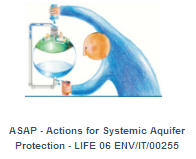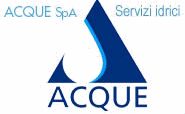Da Wiz-Life+.
Il progetto > Obiettivi/en
(Creata pagina con 'Project Objectives: The overall goal of the WaterIZe ‘WIZ’ spatial planning project is to integrate the protection and sustainable management of water in urban planning proc...') |
|||
| (3 revisioni intermedie non mostrate.) | |||
| Riga 1: | Riga 1: | ||
| - | + | The overall goal of the WaterIZe ‘WIZ’ spatial planning project is ''to integrate the protection and sustainable management of water in urban planning processes and local policy areas, while also taking the impact of climate change into account''.<br> | |
| + | <br> | ||
| + | The aim of WIZ is to achieve the following main targets:<br> | ||
| + | * '''to incorporate long-term analysis of drinking water management into urban spatial planning '''by creating a platform for local authorities to be involved in decision-making processes and the exchange of information for informed decisions;<br> | ||
| + | *''' to contribute to the integration of the European Framework for Adapting to Climate Change''' (COM(2009) 147) in other local and EU regulations, particularly in relation to future water management conditions;<br> | ||
| + | *''' to increase public participation and awareness by involving citizens and businesses''' (particularly SMEs) in water governance;<br> | ||
| + | * '''to create a network of European projects within the Water supply and sanitation Technology Platform''' ('''WssTP''') and increase transnational co-operation regarding water management;<br> | ||
| + | <br> | ||
| + | Finally, WIZ is primarily directed towards public decision-making processes, in order to increase both the policy-makers' ability to evaluate the potential impact of their choices, and their responsiveness to citizens. The level of institutionalization of the WIZ method in local policy-planning is the major measure of success. | ||
| - | |||
| - | + | [[Category:Progetto]] | |
| - | + | ||
| - | + | ||
| - | + | ||
| - | + | ||
| - | + | ||
| - | + | ||
Versione attuale delle 15:45, 22 mar 2011
The overall goal of the WaterIZe ‘WIZ’ spatial planning project is to integrate the protection and sustainable management of water in urban planning processes and local policy areas, while also taking the impact of climate change into account.
The aim of WIZ is to achieve the following main targets:
- to incorporate long-term analysis of drinking water management into urban spatial planning by creating a platform for local authorities to be involved in decision-making processes and the exchange of information for informed decisions;
- to contribute to the integration of the European Framework for Adapting to Climate Change (COM(2009) 147) in other local and EU regulations, particularly in relation to future water management conditions;
- to increase public participation and awareness by involving citizens and businesses (particularly SMEs) in water governance;
- to create a network of European projects within the Water supply and sanitation Technology Platform (WssTP) and increase transnational co-operation regarding water management;
Finally, WIZ is primarily directed towards public decision-making processes, in order to increase both the policy-makers' ability to evaluate the potential impact of their choices, and their responsiveness to citizens. The level of institutionalization of the WIZ method in local policy-planning is the major measure of success.






